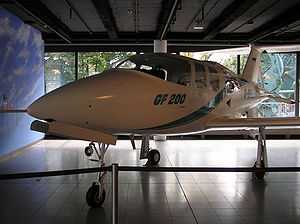Grob GF 200
| GF 200 | |
|---|---|
 | |
| Role | Business aircraft |
| National origin | Germany |
| Manufacturer | Grob Aircraft |
| First flight | 26 November 1991 |
| Number built | 1 |
|
| |
The Grob GF 200 was a business aircraft of unorthodox design developed in Germany during the 1990s. It was a low-wing cantilever monoplane with retractable tricycle undercarriage and a highly streamlined fuselage. The engine was mounted within the fuselage, to the rear of the passenger cabin, and drove the pusher propeller via a driveshaft. The GF 200 has a T-tail, but also a large ventral fin beneath the fuselage. Like other Grob designs, construction throughout was of composite materials, in the case of this particular aircraft, including the driveshaft.
Development commenced in 1983 but was postponed due to concerns about achieving certification for the composite design. However, with financial support from the German government, development commenced in earnest by the end of the decade. The project officially launched at the Hannover Show in May 1988, at which a mockup of the design was displayed and a hope expressed to have the aircraft flying within two years. As it transpired, the prototype was rolled out in March 1991, in the hope of a first flight by May, and which finally took place on 26 November. The aircraft made its first public appearance at the Berlin Air Show in 1992. Initial flight tests revealed problems with engine cooling and excessive noise. The former concern was addressed by a redesign of the engine air intakes.
The prototype was intended as a test aircraft and technology demonstrator, and lacked many of the refinements that would have been incorporated into a production aircraft, including cabin presurisation, de-icing equipment, and even a complete cabin interior. When Grob was unable to find financial backing to take the design further, the company embarked on the construction of a more "true-to-life" prototype in 1997, the GF 250, in the belief that this would prove more attractive to potential business partners.
Further planned developments included the turboshaft-powered GF 300, and the GF 350 with twin turboshaft engines driving a common propeller.
Specifications (GF 200)
General characteristics
- Crew: One pilot
- Capacity: 4 passengers
- Length: 8.70 m (28 ft 6 in)
- Wingspan: 11.00 m (36 ft 1 in)
- Height: 3.42 m (11 ft 3 in)
- Wing area: 12.5 m2 (135 ft2)
- Gross weight: 1,600 kg (3,527 lb)
- Powerplant: 1 × Teledyne Continental TSIOL-550, 230 kW (310 hp)
Performance
- Cruising speed: 370 km/h (230 mph)
- Range: 1,850 km (1,160 miles)
- Rate of climb: 6.2 m/s (1,220 ft/min)
References
- Taylor, Michael J. H. (1989). Jane's Encyclopedia of Aviation. London: Studio Editions. p. 927.
- Simpson, R. W. (1995). Airlife's General Aviation. Shrewsbury: Airlife Publishing. pp. 200, 203.
- "Grob launches GF.200". Flight International: 5. 14 May 1988. Retrieved 2008-04-14.
- "Grob pushes for GF200 roll-out". Flight International: 20. 27 March 1991 - 2 April. Retrieved 2008-04-14. Check date values in:
|date=(help) - "Grob GF200 pusher set to fly". Flight International: 4. 6–12 November 1991. Retrieved 2008-04-14.
- "Grob tests highlight exhaust problem". Flight International: 11. 24–30 June 1992. Retrieved 2008-04-14.
- "Grob seeks partner to finance GF200 launch". Flight International: 21. 16–22 November 1994. Retrieved 2008-04-14.
- "Grob plans GF200 stretch version". Flight International: 21. 13–19 September 1995. Retrieved 2008-04-14.
- Henley, Peter (15–21 November 1995). "Novel Design". Flight International: 34–36. Retrieved 2008-04-14.
- "Grob builds variant of GF200". Flight International: 25. 19–25 November 1997 1997. Retrieved 2008-04-14. Check date values in:
|date=(help)
External links
| Wikimedia Commons has media related to Grob GF 200. |
| ||||||
| ||||||||||||||||||||||